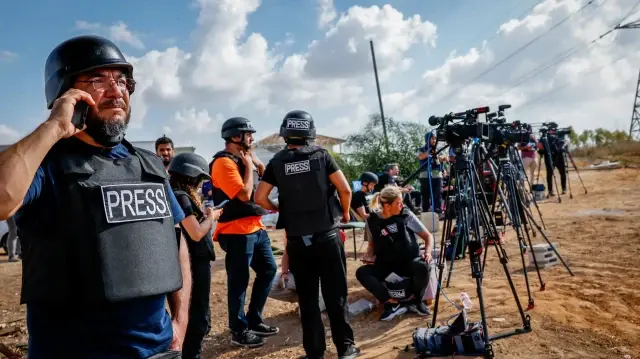
Lebanese Journalists Survive Israeli Gunfire in Southern Lebanon
January 26, 2025
Rising Violence Against Journalists in Mexico: The Urgent Call for Justice
January 26, 2025January 26, 2025 – Syria –
The fall of Bashar al-Assad’s regime in Syria has exposed horrifying new evidence of systematic repression, mass atrocities, and an aggressive war on journalists. Newly uncovered documents, obtained by OCCRP and its Syrian partner SIRAJ, show how Syrian intelligence agencies extensively monitored, harassed, and targeted journalists, both domestic and foreign, branding them as foreign agents and enemies of the state. Ordinary journalistic activities — interviewing civilians, gathering information, or collaborating with international media organizations — were treated as acts of espionage. Even prominent networks like the Global Investigative Journalism Network were labeled as conspiratorial tools of foreign governments.
Among the documents were records of surveillance operations against foreign correspondents and investigations into the whereabouts of missing international journalists who had entered Syria during the height of the civil war. The files reveal the Assad regime’s deep obsession with controlling information and silencing any voices that could challenge its narrative.
In parallel, the Syrian Network for Human Rights (SNHR) has published a devastating account of Assad’s 14-year rule. Since 2011, the regime is responsible for mass arrests, torture, forced disappearances, extrajudicial killings, and chemical weapon attacks. Tens of thousands of civilians — including women and children — were detained, many tortured to death in secret prisons. The infamous Sednaya prison, often referred to as a “human slaughterhouse,” witnessed large-scale executions and systemic torture. Mass graves, such as the one discovered near al-Qutayfah containing over 100,000 bodies, stand as chilling evidence of these crimes.
With the regime’s collapse, activists and investigators are racing against time to collect and preserve crucial evidence from these sites. Many archives have already been looted or destroyed as former officials attempt to cover their tracks. The surviving documentation may serve as critical evidence for future war crimes tribunals and international justice efforts.
These revelations underscore the brutal lengths the Assad regime went to silence dissent, crush the free press, and maintain its grip on power. As Syria turns a new page, the world watches, hoping that accountability will finally catch up with one of the modern era’s most brutal dictatorships.
References –




